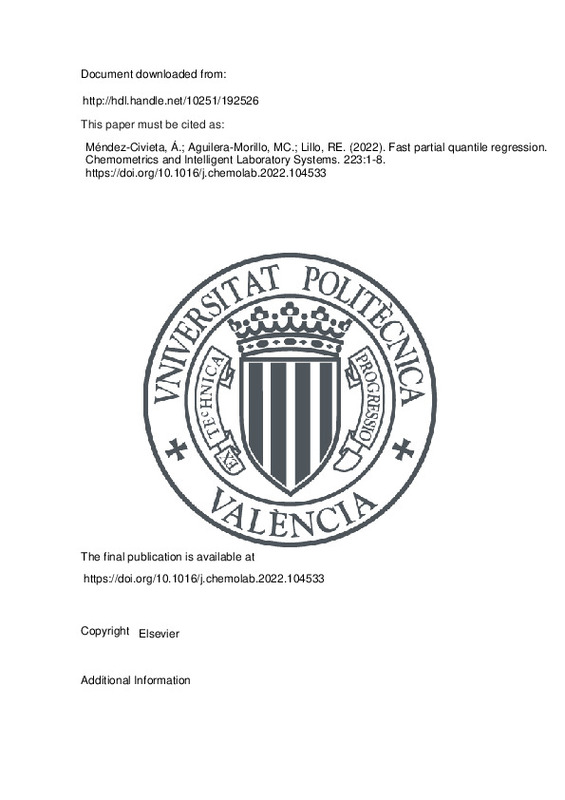JavaScript is disabled for your browser. Some features of this site may not work without it.
Buscar en RiuNet
Listar
Mi cuenta
Estadísticas
Ayuda RiuNet
Admin. UPV
Fast partial quantile regression
Mostrar el registro sencillo del ítem
Ficheros en el ítem
| dc.contributor.author | Méndez-Civieta, Álvaro
|
es_ES |
| dc.contributor.author | Aguilera-Morillo, M. Carmen
|
es_ES |
| dc.contributor.author | Lillo, Rosa E.
|
es_ES |
| dc.date.accessioned | 2023-03-20T19:01:14Z | |
| dc.date.available | 2023-03-20T19:01:14Z | |
| dc.date.issued | 2022-04-15 | es_ES |
| dc.identifier.issn | 0169-7439 | es_ES |
| dc.identifier.uri | http://hdl.handle.net/10251/192526 | |
| dc.description.abstract | [EN] Partial least squares (PLS) is a dimensionality reduction technique used as an alternative to ordinary least squares (OLS) in situations where the data is colinear or high dimensional. Both PLS and OLS provide mean based estimates, which are extremely sensitive to the presence of outliers or heavy tailed distributions. In contrast, quantile regression is an alternative to OLS that computes robust quantile based estimates. In this work, the multivariate PLS is extended to the quantile regression framework, obtaining a theoretical formulation of the problem and a robust dimensionality reduction technique that we call fast partial quantile regression (fPQR), that provides quantile based estimates. An efficient implementation of fPQR is also derived, and its performance is studied through simulation experiments and the chemometrics well known biscuit dough dataset, a real high dimensional example. | es_ES |
| dc.description.sponsorship | This research was partially supported by research grants and projects PID2020-113961GB-I00 and PID2019-104901RB-I00 from Agencia Estatal de Investigacion, Spain. | es_ES |
| dc.language | Inglés | es_ES |
| dc.publisher | Elsevier | es_ES |
| dc.relation.ispartof | Chemometrics and Intelligent Laboratory Systems | es_ES |
| dc.rights | Reconocimiento - No comercial - Sin obra derivada (by-nc-nd) | es_ES |
| dc.subject | Partial-least-squares | es_ES |
| dc.subject | Quantile-regression | es_ES |
| dc.subject | Dimension-reduction | es_ES |
| dc.subject | Outliers | es_ES |
| dc.subject | Robust | es_ES |
| dc.subject.classification | ESTADISTICA E INVESTIGACION OPERATIVA | es_ES |
| dc.title | Fast partial quantile regression | es_ES |
| dc.type | Artículo | es_ES |
| dc.identifier.doi | 10.1016/j.chemolab.2022.104533 | es_ES |
| dc.relation.projectID | info:eu-repo/grantAgreement/AEI/Plan Estatal de Investigación Científica y Técnica y de Innovación 2017-2020/PID2019-104901RB-I00/ES/NUEVAS ESTRATEGIAS EN REGRESION PENALIZADA CON APLICACIONES EN SALUD, DEMOGRAFIA Y ECONOMIA/ | es_ES |
| dc.relation.projectID | info:eu-repo/grantAgreement/AEI/Plan Estatal de Investigación Científica y Técnica y de Innovación 2017-2020/PID2020-113961GB-I00/ES/AVANCES METODOLOGICOS EN MODELOS ESTOCASTICOS CON APLICACIONES AL PROCESAMIENTO FUNCIONAL DE DATOS BIOLOGICOS Y AL ANALISIS DE FIABILIDAD DE SISTEMAS COMPLEJOS EN ELECTRONICA/ | es_ES |
| dc.rights.accessRights | Abierto | es_ES |
| dc.contributor.affiliation | Universitat Politècnica de València. Escuela Técnica Superior de Ingenieros Industriales - Escola Tècnica Superior d'Enginyers Industrials | es_ES |
| dc.description.bibliographicCitation | Méndez-Civieta, Á.; Aguilera-Morillo, MC.; Lillo, RE. (2022). Fast partial quantile regression. Chemometrics and Intelligent Laboratory Systems. 223:1-8. https://doi.org/10.1016/j.chemolab.2022.104533 | es_ES |
| dc.description.accrualMethod | S | es_ES |
| dc.relation.publisherversion | https://doi.org/10.1016/j.chemolab.2022.104533 | es_ES |
| dc.description.upvformatpinicio | 1 | es_ES |
| dc.description.upvformatpfin | 8 | es_ES |
| dc.type.version | info:eu-repo/semantics/publishedVersion | es_ES |
| dc.description.volume | 223 | es_ES |
| dc.relation.pasarela | S\476593 | es_ES |
| dc.contributor.funder | Agencia Estatal de Investigación | es_ES |







![[Cerrado]](/themes/UPV/images/candado.png)

